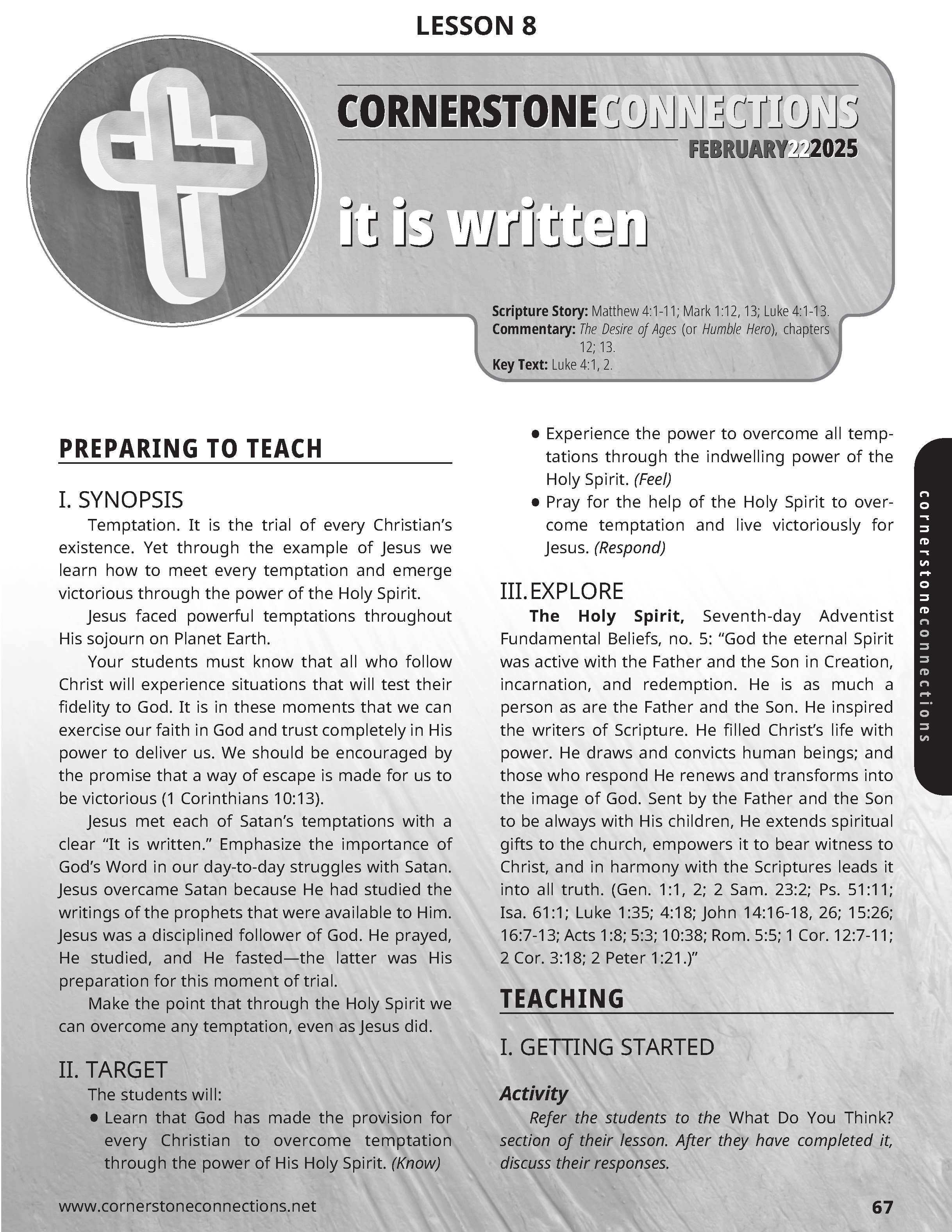"It Is Written"
Click below to download the Cornerstone Connections leader’s guide and student lesson. This week’s resources also include two lesson plans and a discussion starter video which offer different ways of looking at the topic. Each lesson plan includes opening activities, scripture passages, discussion questions, and real-life applications.
After Jesus was led by the Holy Spirit into the wilderness to be tempted by Satan, He met each of Satan’s temptations with a clear “It is written.” God’s Word holds the same power for us as we meet our day-to-day temptations and struggles.
Humble Hero (Desire of Ages)
Chapter 12 - The Wilderness Temptation

Humble Hero (Desire of Ages)
Chapter 13 - The Victory

As a result of this lesson, we want students to see how Jesus rejected self-centeredness, presumption, and earthly power—temptations that have haunted Christianity ever since.
Items needed: Pen, paper, markers, colored pencils, crayons, etc.
Have your students illustrate the different temptations Jesus faced in the wilderness. You can also assign a particularly gifted student (or teacher or guest) to do so ahead of the time. Have the passages read, either by the students or someone else, as they work on their illustrations. Participants can choose which temptation to illustrate, or make a triptych (set of three). Encourage them to imagine the temptations in the modern world setting, and to personalize them as much as possible.
Read Matthew 4:1-11.
1 Then Jesus was led by the Spirit into the wilderness to be tempted by the devil. 2 After fasting forty days and forty nights, he was hungry. 3 The tempter came to him and said, “If you are the Son of God, tell these stones to become bread.”
4 Jesus answered, “It is written: ‘Man shall not live on bread alone, but on every word that comes from the mouth of God.’”
5 Then the devil took him to the holy city and had him stand on the highest point of the temple. 6 “If you are the Son of God,” he said, “throw yourself down. For it is written: “ ‘He will command his angels concerning you, and they will lift you up in their hands, so that you will not strike your foot against a stone.’”
7 Jesus answered him, “It is also written: ‘Do not put the Lord your God to the test.’”
8 Again, the devil took him to a very high mountain and showed him all the kingdoms of the world and their splendor. 9 “All this I will give you,” he said, “if you will bow down and worship me.”
10 Jesus said to him, “Away from me, Satan! For it is written: ‘Worship the Lord your God, and serve him only.’”
11 Then the devil left him, and angels came and attended him.
12 At once the Spirit sent him out into the wilderness, 13 and he was in the wilderness forty days, being tempted by Satan. He was with the wild animals, and angels attended him.
Read Luke 4:1-13.
1 Jesus, full of the Holy Spirit, left the Jordan and was led by the Spirit into the wilderness, 2 where for forty days he was tempted by the devil. He ate nothing during those days, and at the end of them he was hungry.
3 The devil said to him, “If you are the Son of God, tell this stone to become bread.”
4 Jesus answered, “It is written: ‘Man shall not live on bread alone.’”
5 The devil led him up to a high place and showed him in an instant all the kingdoms of the world. 6 And he said to him, “I will give you all their authority and splendor; it has been given to me, and I can give it to anyone I want to. 7 If you worship me, it will all be yours.”
8 Jesus answered, “It is written: ‘Worship the Lord your God and serve him only.’”
9 The devil led him to Jerusalem and had him stand on the highest point of the temple. “If you are the Son of God,” he said, “throw yourself down from here. 10 For it is written: “ ‘He will command his angels concerning you to guard you carefully; 11 they will lift you up in their hands, so that you will not strike your foot against a stone.’”
12 Jesus answered, “It is said: ‘Do not put the Lord your God to the test.’”
13 When the devil had finished all this tempting, he left him until an opportune time.
The fascinating thing about the temptations Satan used to try to trick Jesus is that they weren’t sins we typically think of—like stealing or lying or murder. Instead, all three are about the misuse of faith—doing what could seem to be the right thing, but for the wrong reasons.
Share with your students a time when you may have done the right thing for the wrong reason, then ask anyone to share their own thoughts or experiences on that idea. Take time to look at and discuss the illustrations described at the beginning of this lesson.
It’s easy to look at the story of Jesus’ meeting the devil in the wilderness as just a nice thumbs up about resisting temptation. Yet the temptations Jesus rejected are specific ones that have plagued the church for nearly 2,000 years—and which, more often than not, the church has not rejected, but actively embraced.
Self-centeredness. Presumption. Political power. The devil presented these temptations hoping they would destroy Jesus’ mission to save us. Yet again and again, the church has defined itself by exactly those things.
Today we’re looking at how Jesus’ mission clashes with human standards of success—and human standards, period.
The Roman Empire followed a strategy known as “bread and circuses,” believing that people would stay contented, non-rebellious citizens if the government ensured they had food and entertainment. In the wilderness, Satan urged Jesus to attract followers in much the same way.
Look again at Matthew 4:1-4.
1 Then Jesus was led by the Spirit into the wilderness to be tempted by the devil. 2 After fasting forty days and forty nights, he was hungry. 3 The tempter came to him and said, “If you are the Son of God, tell these stones to become bread.”
4 Jesus answered, “It is written: ‘Man shall not live on bread alone, but on every word that comes from the mouth of God.’”
Read Matthew 4:5-7.
5 Then the devil took him to the holy city and had him stand on the highest point of the temple. 6 “If you are the Son of God,” he said, “throw yourself down. For it is written: “‘He will command his angels concerning you, and they will lift you up in their hands, so that you will not strike your foot against a stone.’”
7 Jesus answered him, “It is also written: ‘Do not put the Lord your God to the test.’”
When we try to use the government to force religion on society, it is nothing more than idolatry—draining the life out of faith and leaving only empty symbols. Yet in the history of Christianity, the church has at times used the state to promote and enforce itself. Christianity using the power of the state not only distorts the message of the Savior who declared “My kingdom is not of this world” (John 18:36), but it makes religion impersonal, external, and tribal. It makes religion all about power and control for a selected group of people, rather than honoring the freedom of choice God gives us and loving our neighbors as ourselves.
Read Matthew 4:8-11.
8 Again, the devil took him to a very high mountain and showed him all the kingdoms of the world and their splendor. 9 “All this I will give you,” he said, “if you will bow down and worship me.”
10 Jesus said to him, “Away from me, Satan! For it is written: ‘Worship the Lord your God, and serve him only.’”
11 Then the devil left him, and angels came and attended him.
“It seemed like a good idea at the time.” Stories that include those words don’t usually end well. And while the Bible doesn’t spell out how to make every decision in life, its principles can keep you from making some pretty poor choices—including ones that seem like great ideas. Look to Jesus, and stay connected with Him through daily prayer and Bible study. The principles Jesus preached will never let you down.
In the week ahead, consider how presumptuousness, self-centeredness, and a desire to control others may affect the world you live in. How might each of those issues shape:
Share your thoughts with an adult or peer and discuss possible ways to share what you discover.

LEADER’S NOTE
For a Relational Bible Study (RBS) you’ll want to get into the Scripture passage and encourage the youth to imagine participating in the story while it’s happening. Then you will be able to better apply it to your own situation today.
You will need to ask God for the Holy Spirit to be present as your small group discusses the questions (no more than 3-6 people in a group is recommended). Start with the opening question. It is a personal question and the answer is unique for each individual. There is no right answer and nobody is an expert here, so don’t be surprised when you hear different responses. You are depending on the Holy Spirit to be present and to speak through your group. Say what God prompts you to say, and listen to what others share.
Take turns reading the chapter out loud. Follow that with giving the students some time to individually mark their responses to the questions (a PDF version of the handout is available as a download). This gives each person a starting point for responding when you start to share as a group. Next, begin the discussion by asking the students to share what they marked and why on each question as you work your way through. Feel free to take more time on some questions than others as discussion warrants.
Encourage each person in the group to apply what is discussed to their personal lives and to share with the group what they believe God wants them to do. Then ask them to pray that God will help each of them to follow through in doing so. Remind them to expect that God will show them ways to live out the message of this passage in the coming week, and that they are free to ask others in the group to help hold them accountable.
We are halfway through the wonderful journey that this quarter has taken us on, yet it feels like Jesus’ life is just beginning! We saw Jesus grow into a man of integral character, and we saw Him publicly declare His mission last week. However, He is just beginning to face the first of many trials in His three-year career. This trial is considered the most pivotal of His entire career, and He does it for us.
Every day we are hounded by temptations—weaknesses that we have a hard time saying no to. Each temptation that Jesus endured in that wilderness basically encompasses the temptations we go through today. Clearly, we each have our personalized weaknesses that the devil can use against us, but in the history of the world, everyone struggles with these three issues. So, what can we learn from Jesus’ experience? We can learn how to successfully defeat the devil and cast him aside in the name of God. We may think that Jesus was perfect at the time, but we must remember that He was functioning from only His human nature. And after 40 days of meditating and fasting in the wilderness, He was just as vulnerable as we would be. As we explore His interaction with the king of darkness, what can we learn about overcoming temptation? Let us pray so that God will help us say, “Away with thee” to any temptations the devil puts in our path.
Have you ever felt yourself give into temptation?
Read Matthew 4:1-11.
1 Then Jesus was led by the Spirit into the wilderness to be tempted by the devil. 2 After fasting forty days and forty nights, he was hungry. 3 The tempter came to him and said, “If you are the Son of God, tell these stones to become bread.”
4 Jesus answered, “It is written: ‘Man shall not live on bread alone, but on every word that comes from the mouth of God.’”
5 Then the devil took him to the holy city and had him stand on the highest point of the temple. 6 “If you are the Son of God,” he said, “throw yourself down. For it is written: “ ‘He will command his angels concerning you, and they will lift you up in their hands, so that you will not strike your foot against a stone.’”
7 Jesus answered him, “It is also written: ‘Do not put the Lord your God to the test.’”
8 Again, the devil took him to a very high mountain and showed him all the kingdoms of the world and their splendor. 9 “All this I will give you,” he said, “if you will bow down and worship me.”
10 Jesus said to him, “Away from me, Satan! For it is written: ‘Worship the Lord your God, and serve him only.’”
11 Then the devil left him, and angels came and attended him.
Facing these temptations, especially when one is in such a vulnerable state, would be detrimental to any of us, and we would most likely give in. However, Jesus stood firm in His faith, proving that He was the Son of God, and that His heavenly Father would never allow Him to fall while He relied on Him. Jesus showed a tremendous strength of character, one that we strive to model as Christians. He also proved that God will always provide us with a way out of temptations – we just need to call on Him and He will send His army to deliver us. As we face our own daily battle with temptation in this sinful world, call upon God, call upon His word, and He will be there for you in your time of need to say, “Away with thee, Satan!”
Every day we each struggle with temptations, whether they are big or small. Using Jesus’ example, what are some healthy ways to battle temptation? In the applications below, you will find some healthy ways to fight temptation in your daily life.
Jesus quoted the Bible to defeat the devil at his own game. Go for a scavenger hunt in the Bible and find some promises to help you when you are feeling weak. Then write them down in your prayer journal. Next time you feel as if the devil is near you, whip out one of those verses and denounce him.
The best way we can fight temptation is by recognizing what tempted us. Make a list, in a private book, of everything that you feel causes you to go down the wrong path. Then, ask God to help you with each one, maybe praying for one per night.
Sometimes, dealing with our temptations is too much to handle alone. Seek counsel from a trusted adult, such as a pastor, parent, etc. While you speak to them about your temptations, ask them what they did in those moments that they felt the devil taunting them. How can their experiences relate to yours? What can you take from their experiences to help you?




